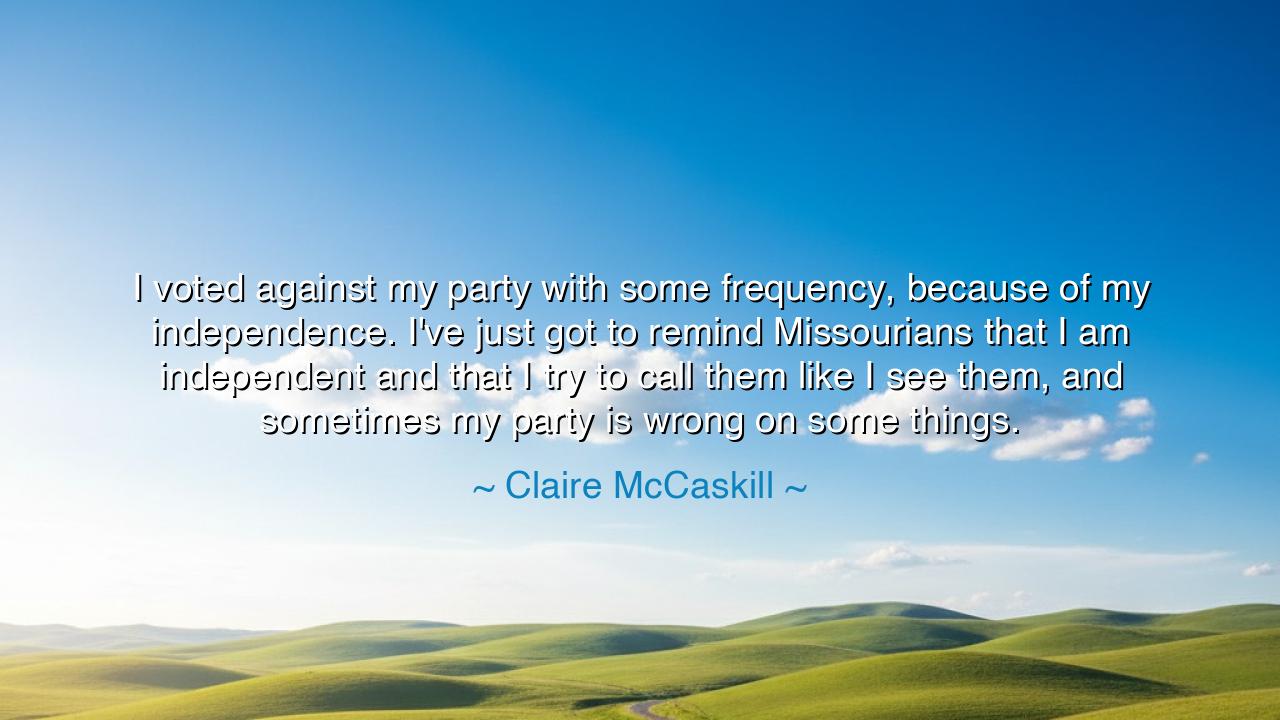
I voted against my party with some frequency, because of my
I voted against my party with some frequency, because of my independence. I've just got to remind Missourians that I am independent and that I try to call them like I see them, and sometimes my party is wrong on some things.






The Courage to Stand Alone
Hear the voice of Claire McCaskill, a stateswoman of courage and conviction, who once spoke these words of integrity and resolve:
“I voted against my party with some frequency, because of my independence. I've just got to remind Missourians that I am independent and that I try to call them like I see them, and sometimes my party is wrong on some things.”
These words are not merely the reflections of a politician—they are the song of the eternal spirit that values truth over tribe, principle over power, and independence over conformity. In them lies the timeless struggle of the individual who walks the narrow path between loyalty and conscience. For the wise know: allegiance to justice must always stand higher than allegiance to the crowd.
The Meaning of Independence
When McCaskill speaks of independence, she invokes a virtue that predates nations and parties alike. In the republics of old, this was called civic virtue—the courage to act not for favor or faction, but for the good of the people and the purity of one’s own heart. To stand apart from one’s party, one’s tribe, or one’s comfort, is no small act—it is the fire-test of integrity.
To say “sometimes my party is wrong” is to challenge not only colleagues, but the subtle chains of belonging. For in every age, the easy road is to agree, to nod, to be silent. But McCaskill’s words remind us that democracy, like the human soul, depends upon the courage of those who will not bow to pressure when the truth demands resistance.
The Ancient Example of Integrity
Consider the story of Marcus Junius Brutus, the Roman who rose against his friend Julius Caesar when he believed the Republic was in danger. History has debated his actions for centuries, but his motive was rooted in independence of conscience. He placed principle above loyalty, truth above comfort. In this, he stands as a symbol of the same courage that McCaskill describes—the willingness to act for what one believes right, even when the crowd turns its back.
Such acts are lonely. The one who stands apart is often misunderstood, even condemned. Yet from such solitude springs greatness. For it is written in the wisdom of the ancients: Better to stand alone in truth than to sit crowned in falsehood.
The Burden of Conscience
McCaskill’s words also reveal the burden of those who carry independence in their hearts. To vote against one’s party, one’s peers, or one’s allies, is not an act of rebellion for its own sake—it is the mark of one who listens first to the still voice within. The cost of such courage is heavy. One risks isolation, criticism, even betrayal. Yet those who seek to serve the people must serve not ambition, but honor.
In the heat of politics, where loyalty is currency and compromise is survival, independence becomes a sacred act—a form of quiet heroism. McCaskill’s reminder to her people, “I try to call them like I see them,” is a declaration of honesty in a world that too often rewards deception.
The Power of Truth Over Tribe
The ancients warned that when nations value tribe over truth, decay begins. The philosopher Plato wrote that justice perishes when citizens follow the crowd rather than the law of reason. McCaskill’s words thus carry an older echo: the eternal need for voices that speak not what others wish to hear, but what must be said.
Her defiance is not arrogance—it is fidelity to truth. It reminds us that unity without integrity is slavery, and loyalty without conscience is blindness. True strength lies not in agreeing with one’s side, but in having the wisdom to see when one’s side has strayed.
The Lesson of the Independent Spirit
From McCaskill’s example, we learn that independence is not rebellion—it is responsibility. It demands self-knowledge, humility, and courage. It requires that one’s allegiance be not to the flag of a faction, but to the eternal law of truth and justice. Whether in politics, friendship, or daily life, each of us must find the courage to speak as conscience commands, even when the world frowns upon us.
For truth is not born in the echo of agreement, but in the silence of reflection and the light of conviction. The one who dares to see differently keeps the balance of the world intact.
The Eternal Call
Therefore, let these words be written upon the hearts of all who lead, and all who follow: independence is the lifeblood of honor. When you see wrong, speak against it; when you see right, defend it—even when it costs you the comfort of belonging. Be as McCaskill was: loyal not to party, but to truth; guided not by approval, but by integrity.
For in the end, the measure of a person—or a nation—is not how loudly they agree, but how bravely they stand when standing alone. And those who stand for truth, though solitary for a time, will one day be remembered as the builders of freedom itself.






AAdministratorAdministrator
Welcome, honored guests. Please leave a comment, we will respond soon